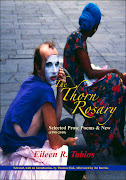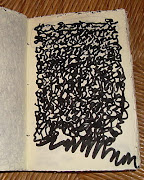Okay. So some of the early fruits of creativity spurred on by the
Babaylan Conference are now making their way out into the world!
For Mom, this means her memoir-short story "Dawac" has been sent for future publication in the Babaylan Special Issue forthcoming from
OurOwnVoice. For me, two poems ("The Hundredth Monkey Phenomenon" and "Sacred Time") from the five Babaylan-poems I've written so far have just been accepted for
-- UPDATE: and are now published in -- OCHO 30, a literary journal edited by Didi Menendez.
Here's an excerpt from Mom's memoir "Dawac":
I did not go to school the following day. I wanted to see what a dawac was. Apo Kattim arrived with her assistant. I noticed that she brought a long buneng (long knife) in its wooden sheath. She went to the bedroom to see Eliel right away, then returned to the descanso where we waited. Since the descanso was cleared of all the chairs, Apo Kattim and her assistant remained standing while they talked. My grandmother invited them to the kitchen for coffee. Apo Kattim said coffee would be good because although they had breakfast, they did not have time for coffee.
After they had their coffee, Apo Kattim returned to the descanso and asked to see the coconuts. She nodded her approval when she saw that they were well husked. My mother also pointed to the rolled floor mat placed against the wall. Apo Kattim unsheathed the buneng and place it on the table. She handed the sheath to her assistant who placed it under the table. The assistant took a folded dinwa and placed it on a corner of the table. Apo Kattim and her assistant unrolled the floor mat and spread it on the floor, leaving enough space between it and the wall to allow a person to walk around it. Then Apo Kattim asked for a drinking glass.
“With water?” asked Tiang Ciliang.
“No,” said the assistant, “just the glass.”
Tiang Ciliang went to the kitchen and came back with the drinking glass. The assistant took it and placed it on the table. She placed a long piece of metal beside it.
Apo Kattim looked at all the things on the table then asked for the blanket that she told my mother to prepare. My grandmother brought a folded blanket. Apo Kattim’s assistant took it and spread it on the floor. Apo Kattim told my mother to sit on the blanket. Then she turned to Manong Toring and told him to bring Eliel out. “And cover him with his blanket when you bring him out,” she said.
“And now that Eliel will not be on his bed for sometime, somebody should change all his bed linens,” Apo Kattim suggested.
Manong Toring came back with Eliel in his arms, the blanket trailing the floor.
“Don’t trip on the blanket,” cautioned Tiang Ciliang, walking toward them and catching the part of the blanket that reached all the way down to the floor. If Manong Toring had stepped on that part of the blanket, he would surely have stumbled with Eliel in his arms.
“Put him down here,” directed Apo Kattim, pointing to the spot near my mother. “Sit him facing the wall.”
As soon as Eliel was seated properly, Tiang Ciliang walked to Eliel’s bedroom. Somebody had to change Eliel’s bed linens.
“Move closer to Eliel and hold him up,” Apo Kattim told my mother. “He still can’t sit up by himself.”
Apo Kattim placed the flat basin behind Eliel. Then she turned to us and warned us not to talk or move around while she was doing the dawac. She also told Manong Toring to stand near the stairs and stop the people below from coming up when they heard her chanting, or stop them from talking in loud voices.
Some neighbors must have heard that a mannawac was in our house and they came to satisfy their curiosity. However, they sat on the benches under the house. They did not come up.
Apo Kattim took the dinwa, nodded to her assistant, and sat down near Eliel. She covered her head with the dinwa and extended her right hand. Her assistant gave her the piece of metal. Apo Kattim extended her left hand. Her assistant placed the drinking glass in her hand, guiding Apo Kattim’s fingers to hold the glass securely.
Everyone was quiet. I felt funny in the eerie silence. Apo Kattim started hitting the drinking glass with the piece of metal. The dawac started. Apo Kattim was calling to the anitos and summoning them to come to her assistance.
“O – O – O – O – O – O,” Apo Kattim ‘s ululating cry accompanied by the tinkling sounds of the glass could be heard could be heard by the whole neighborhood.
“Umali cayo Isna. (Come here.) Umali cayo ta i- la-enyo od nan masakit ay anac si Inggo.” Apo Kattim was calling the anitos to come and see the sick son of Inggo. (Inggo was my late father’s name.)
“O – O – O – O – O – O. Masegang cayo. (Have pity.) Masegang cayo isnan ubing, Masegang cayo. Umali cayo,” was the repeated cry of Apo Kattim. “Umali cayo ta palaingen yo nan ubing ta umey met maki ayayam issa ayan dey appoyo.” She continued her call, then stopped striking the glass with the metal. Her assistant took the drinking glass and metal from her and put them back on the table.
Suddenly, Apo Kattim stood up, removed the dinwa that covered her head and flung it to her assistant. She looked strange to me, as though she had become a different person. She walked to the table, picked up her buneng, held it high with her right hand above her head, and started dancing around Eliel and my mother, waving her buneng in circular motions. Throughout, she chanted words in the Itneg dialect that I couldn’t understand. I began to be afraid that she might get dizzy and fall with that buneng in her hand. I looked around and saw that Manong Toring also looked concerned and was ready to come to Apo Kattim’s aid in case she fell.
Apo Kattim danced to the table and took one of the coconuts with her left hand, extended it and quickly brought her buneng down, splitting the coconut in halves. I heard everybody gasp in surprise and wonder. Who would expect a frail old woman to have the strength she showed when she split the coconut?
*****
And here's an excerpt from my poem "The Hundredth Monkey Phenomenon":
The nearby sea was calm
its clear water
mirroring distant mangroves and islets
to transform them into clouds
floating in the vast, pale blue—
In her slow and lilting voice
U’po Majiling chanted
Everything begins with a dream—


